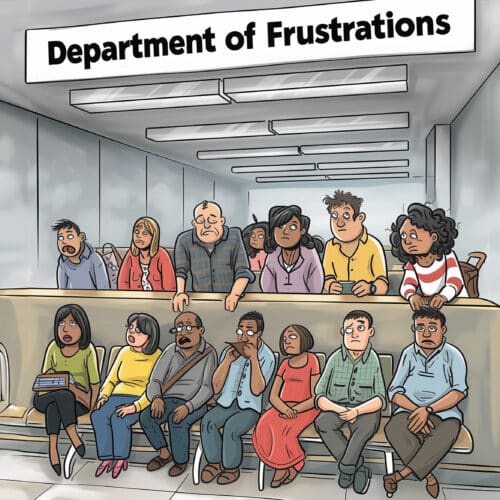“The real voyage of discovery consists not in seeking new landscapes, but in having new eyes.” – Marcel Proust
I recently spent 2 weeks with my elderly mom while she underwent major surgery. We’ve been separated by distance and family dramas for many years, and I was nervous about how both of us would do, getting thrown together for a couple weeks under stressful circumstances. She came through magnificently. For me, it was a gift. A patience, humility, and listening bootcamp. I coach executives on these things every day. Doesn’t mean I’m great at it myself every day. We spent hours laughing and crying over memories of family holidays, my childhood hometown, our moves when I was in 5th and 8th grades to follow my dad’s aeronautics and space program career, and my dad’s passing a few years ago. And we touched gingerly on some of the more painful stories about our family dysfunction that never seem to go away.
 Mom was in a quiet and reflective mood one afternoon, lying on her couch as I hung a particularly geeky picture of my parents, my brother, and I on the wall (big hair, pimples, braces, glasses, facebow, you name it, it’s in there). She said: “I’m sorry I didn’t get to know your children.” I froze. There were layers of challenging circumstances for our family as my children were born and grew up thousands of miles away from Mom and Dad. She was feeling regret over what she viewed as her poor performance compared to the Saturday Evening Post picture of the perfect Grandma, in her apron teaching her grandchildren how to bake cookies. The thing is, I had the same picture in my head of what a Grandma was supposed to be. Critical thoughts welled inside my head, totally unhinged from reality.
Mom was in a quiet and reflective mood one afternoon, lying on her couch as I hung a particularly geeky picture of my parents, my brother, and I on the wall (big hair, pimples, braces, glasses, facebow, you name it, it’s in there). She said: “I’m sorry I didn’t get to know your children.” I froze. There were layers of challenging circumstances for our family as my children were born and grew up thousands of miles away from Mom and Dad. She was feeling regret over what she viewed as her poor performance compared to the Saturday Evening Post picture of the perfect Grandma, in her apron teaching her grandchildren how to bake cookies. The thing is, I had the same picture in my head of what a Grandma was supposed to be. Critical thoughts welled inside my head, totally unhinged from reality.
I have a formula for this kind of distress. It serves me well when I feel that my next words matter a lot and I want to get it right. I ask myself three simple questions:
- What’s my highest Purpose?
- What’s the Context right now?
- Is Accountability necessary to my Purpose?
Elevate your leadership skills by leading with Heart and Accountability.
PointerWise can help – explore our coaching options today.
Effective leaders intuitively apply these principles as the foundation of performance leadership. Purpose, Context and Accountability are crucial to leading team success. Ask yourself how you’re doing here. Has your organization come to tolerate a pretty bureaucratic lid on a toxic lack of accountability? There’s a BIG difference between performance management (i.e., that nasty lid) and performance leadership (i.e., you actually give a crap about whether the process works to make you, your team, and your organization more effective).
So first, get something straight. The purpose of any performance discussion is NOT to accurately capture everything your direct report did or didn’t do last week, last month, or last year. Nor should it be fueled by your need to make people feel good about themselves (Hint: That’s not your job and you can’t do it anyway). Maybe your organization keeps kicking the can of Accountability down the road, but the thing about that can is it keeps filling up with bad juju and sooner or later, that pretty lid will break open. And the green goo it spews out will hit you and everyone you’ve been trying so hard to protect. Everyone.
 So, what are the reasons we feel comfier with that pretty lid? What’s the mind trick we play on ourselves to avoid the hard work of effective leadership (i.e., the messy, emotional, unpredictable human part). First, having authentic, purpose-driven dialogue with people who are close to us (my mom, your employee) is personal. It requires eye contact. It requires both brutality and gentleness. Bad news and good news – all the stuff that is the hardest thing people do with each other. Soft science my a$$!
So, what are the reasons we feel comfier with that pretty lid? What’s the mind trick we play on ourselves to avoid the hard work of effective leadership (i.e., the messy, emotional, unpredictable human part). First, having authentic, purpose-driven dialogue with people who are close to us (my mom, your employee) is personal. It requires eye contact. It requires both brutality and gentleness. Bad news and good news – all the stuff that is the hardest thing people do with each other. Soft science my a$$!
And then there’s that compensation thing. That bit, fat, spiky tail wags the dog of authentic performance leadership all day long, every day, during the annual performance review process. Will this employee get what he wants or needs to stay put, to save face, to survive? Compensation Cramps are more destructive than all the bad bosses you and all your friends have ever known. I’m sure you’re a good person. Effective leaders are good people because they keep their eyes on the prize – performance – for everyone’s sake. But Do-Gooders beware. Your bleeding heart is bleeding out your organization. “If I don’t give her at least a 3 on everything, she won’t get the raise.” OK, so maybe that’s a wake-up call. “But he needs a raise.” (Um, who doesn’t?). “If she gets a raise, her attitude will improve.” (Really? Is that your reality?) “He’ll leave.” (OK, yes, true. And what message will your team receive? I’m hoping you have some superstars. If you do, they are watching you treat their work like the stale vanilla pudding served up by your under-performers. Guess what they’re thinking of doing?)
And then there’s the “this performance management tool sucks” excuse. Our favorite. Pretty impossible to argue with that one. The rating scale and categories aren’t good enough. The process isn’t short enough, long enough, simple enough, detailed enough or whatever enough. OK. Fair enough. Perfectionism creeps in again. And it’s so convenient to point out what’s not good enough so we don’t have to be good enough. Just like your imperfect family, your ergonomically imperfect habitat, and the consistently inconsistent internet connection in your home office, that’s not going to change any time soon. Soooo, it’s complete BS to throw that up as the reason why you can’t get the job done. Drop it. Back away slowly. Remind yourself what a blank page looks like. Sit down and think. Really think about your team.

Start by forgetting. Forget compensation. Forget the tool. And for goodness sake, forget your bleeding heart needs to please everyone and get them to like you. Keep the empathy, for sure. But that comes in after you make good decisions about your people, what they hear from you, and what they need to hear from you. Remember your Purpose (to improve whatever), Context (Where are you, why, and where do you want to go next?), and Accountability (What have you done to help? What can you do or stop doing now and in the future?).
Now, pull up whatever blank page works for you and write from your heart (assuming you have one). Yep, I said heart. Complete sentences are discouraged. Answer these questions:
-
- What information does this employee need to grow and develop the skillsets your team needs to improve? (Purpose) And what skillsets does the employee want to gain? (If these are two different things, the review process needs to call that out honestly and offer options appropriately).
- What information does this employee need to improve at “playing the game”? (Purpose) You know, the politics of the organization, the soft skills, the impressions made, the stuff that isn’t in the job description. Don’t assume they know. Don’t assume you know. Take a fresh look at what it takes to be successful in your organization. If you’re comfortable with it all, great, easy to discuss. If you’re not comfortable, that’s a whole different blog on values for another day. Still, discuss it, but think about how to avoid getting fired while you look for another job.
Transform your team dynamics.
Discover The Five Behaviors for unmatched performance.
- How can I ensure this employee’s goals are clear for the coming year, and that the through-line to the organization’s strategic goals for improvement are obvious? (Purpose) Clarity of goals and coaching, driving, and dragging your team’s performance toward those goals is your job as an effective leader. You can’t do that without being clear yourself about the organization’s goals and expectations of your team. Communicating that over and over again, in every single meeting and context, is crucial. More on that later. Since your Purpose in having a performance discussion is future success, and the hills you want to take are ahead, goals and how to get to them are the essence of your discussion.
- Have I held this person accountable for everything that matters? (Context and Accountability) Time to tell yourself the truth; be vulnerable; don’t flinch. This is you reviewing yourself for the Context part of this equation. Any time you go to point the finger of truth at someone else, start with you. What do you need to do better? How will you learn and who will you ask for help to do better? This is a skillset as much as a mindset. You can’t help someone as a leader if you are not practicing accountability on yourself.
 Were there performance shortfalls worth repeating? (Context and Accountability) Whatever comes to mind (which is hopefully recorded in those amazing notes you’ve kept), is it just part of the employee’s “learning curve” or are they worth repeating? Skip the ant hills. (Context) What’s an ant hill? Your husband, who is stressed out at work, forgets to buy eggs on the way home. Your wife, who just got promoted, forgets to pay your taxes on time. Not a great idea to mention these in your next “how do we improve our marriage” discussion. Same here. Don’t pick everything. Pick the things that advance necessary Accountability for improving your team’s performance. Writing it down makes it a big deal. This is not your opportunity to show off your talent for recalling historical facts with accuracy. If you already had the discussion months ago and the issue never came up again, just don’t. Show some grace. Not to be nice. To be effective.
Were there performance shortfalls worth repeating? (Context and Accountability) Whatever comes to mind (which is hopefully recorded in those amazing notes you’ve kept), is it just part of the employee’s “learning curve” or are they worth repeating? Skip the ant hills. (Context) What’s an ant hill? Your husband, who is stressed out at work, forgets to buy eggs on the way home. Your wife, who just got promoted, forgets to pay your taxes on time. Not a great idea to mention these in your next “how do we improve our marriage” discussion. Same here. Don’t pick everything. Pick the things that advance necessary Accountability for improving your team’s performance. Writing it down makes it a big deal. This is not your opportunity to show off your talent for recalling historical facts with accuracy. If you already had the discussion months ago and the issue never came up again, just don’t. Show some grace. Not to be nice. To be effective.- If change is needed, what can I do to help? (Accountability) (Hint: It’s ALWAYS needed even if your organization is closing down). This is about holding yourself accountable as a leader. How can you help employees cope with the loss of “the way it was” and move forward through uncertainty to success? Effective leaders study transition management. Change (i.e., what I want you to stop or start) is not the same as transition (i.e., your willingness to let go of what you lose when you adopt the change, figure it out in the messy middle, and come out the other side doing what I asked). If you have no idea what I’m talking about, stay tuned for a piece on Transition Management. And read the book of that name by William Bridges. It’s a classic.
- BONUS QUESTION: What roles do I need on my team, and is this employee in the right role? If you run into a wall here and you don’t like this door, OPEN IT. What’s the door that scares you the most? Yep, that’s the door you need to open. So annoying. But you can’t escape this tried-and-true recipe for becoming a better leader. A better you period. Time for another blank page – What do you need on the team (lose the names and faces – this is a cold, calculating exercise)? What changes need to happen to get you there? Call HR before you do any performance reviews. Why? Because setting goals for your team is where effective performance leadership lives, and if you need a different structure or different people or to rearrange some seats on your bus, walk through it with the experts so that the goals you set during the performance review process actually make sense for your team. Yes, this is hard. Are you thinking it’s easier to fail?
Now go back to the tool and do your best with it. Use your notes to have the discussion.
 As for my mom’s heartfelt wish to improve her chops as a grandma, my Purpose was to support that effort. Not to revisit anything about anything in the past. Even if I did, I’d be biased and just plain wrong about a lot that doesn’t matter anymore. The Context is that my mom has already held herself Accountable to the extent necessary to improve. Phew, nothing to do but embrace her desire to be a Superstar Grandma with enthusiasm and support a worthy change for her and my children. She’s not exactly tech-savvy, and they aren’t exactly lovers of lengthy phone conversations (Context). So now she has a stack of beautiful and thoughtful cards, pre-addressed to my children, just waiting for her next moves. Go mom. Go me. Go kids. Here’s to every one of us being effective leaders for the kind of change that matters most.
As for my mom’s heartfelt wish to improve her chops as a grandma, my Purpose was to support that effort. Not to revisit anything about anything in the past. Even if I did, I’d be biased and just plain wrong about a lot that doesn’t matter anymore. The Context is that my mom has already held herself Accountable to the extent necessary to improve. Phew, nothing to do but embrace her desire to be a Superstar Grandma with enthusiasm and support a worthy change for her and my children. She’s not exactly tech-savvy, and they aren’t exactly lovers of lengthy phone conversations (Context). So now she has a stack of beautiful and thoughtful cards, pre-addressed to my children, just waiting for her next moves. Go mom. Go me. Go kids. Here’s to every one of us being effective leaders for the kind of change that matters most.
“The reason grandparents and grandchildren get along so well is that they have a common enemy.” – Sam Levenson
Questions? Ideas? Let’s Connect!
Reach out to us and discover how we can help your team thrive.






